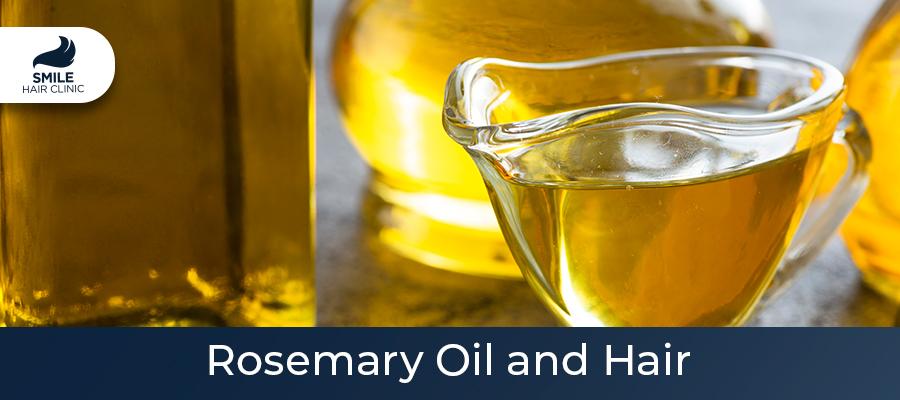Rosemary Oil And Hair

Rosemary Oil and Hair Health
Many people find hair loss frustrating and challenging whether through poor genetics, stress, lack of nutrition or environmental pollutants. Recently, though, some natural remedy can be heard more and more as a solution to stop the hair loss process and increase hair density; Rosemary Oil. With its evergreen, aromatic scent, rosemary oil has become a popular treatment touted to help fortify hair by minimizing shedding. Now, let us look into the science of why rosemary oil may work and how we can use it for thick and healthy tresses.
For centuries, traditional medicine has used rosemary oil for its antimicrobial, anti-inflammatory and antioxidant properties. Extracted from the aromatic herb native to Spain, Italy and other Mediterranean countries, rosemary oil is a popular herb that has been known to support blood flow to the scalp as well as provide stimulation leading directly to growth stimulation. Studies show that the bioactive compounds in rosemary essential oil, including carnosic acid and rosmarinic acid help prevent hair loss to an extent and even promote regrowth of hair.
Improved Scalp Circulation
One of the dominant advantages in terms of hair loss remedy of rosemary oil is to enhance scalp blood circulations. When blood flows better along these wonderful little hairs, Karen, that means supplying them with nutrients and oxygen. Rosemary oil is often preferred by individuals who wish to grow dense hair, as it fortifies already existing strands and fosters new hair growth of higher density.
Antioxidant Protection
Antioxidants found in rosemary oil protect the scalp and hair follicles from oxidative stress and free radical damage. Such free radicals can damage hair and make it vulnerable to breakage and shedding. When these harmful particles dissipate, the rosemary oil helps to maintain a healthier scalped environment that promotes strong, thick hair as time advances.
Anti-Inflammatory Properties
Dandruff and folliculitis are scalp inflammatory disorders that affect normal hair growth. When you have a less irritated scalp than there will be a good environment for hair growth (source) and this is possible due to the anti-inflammatory property of rosemary oil. To keep the hair follicles active and working properly, it is important to have a healthier and less irritated scalp.
DHT Blocker
Research indicates that rosemary oil may help stop dihydrotestosterone (DHT), a hormone involved in hair loss, especially if androgenetic alopecia is the culprit. DHT can reduce hair follicles over time, making them produce thinner and shorter hairs until they no longer grow any hair at all. rosemary oil,, containing natural DHT-blocking properties, may protect hair follicles from this effect and slow or even reverse male pattern baldness by helping the presence of the thicker growth their light coarse hairs were once able to achieve.
Rosemary Oil vs Traditional Hair Loss Treatment
In a few recent studies, rosemary oil yielded similar results as minoxidil, the hair-raising powerhouse famous for his or her hair-domination. A 2015 study published in the journal Skinmed, for instance, found rosemary oil to be as effective as minoxidil for androgenetic alopecia patients. Both groups saw significant improvements in hair growth after using the oil for six months, with rosemary oil causing less side effects than minoxidil. As such, this comparison shines a light on rosemary oil as a natural alternative to chemical-based treatments.
How to Use Rosemary Oil for Hair Loss and More Thickness
Although rosemary oil has great potential benefits when it comes to hair health, using the oil itself correctly is a must if one wishes to gain from its properties. Ways to Use
Rosemary Oil on Hair
Rosmary Oil for Scalp Massage
Mix some drops of rosemary oil with a carrier oil such as coconut or jojoba oil and massage it directly into your scalp. Which both brings the benefits of rosemary oil right to the hair follicles, and relaxes and circulates. Leave on for 20–30 minutes—wash your hair afterward with shampoo (works best).
Mixing Rosemary Oil with a Shampoo
Rosemary oil can also be used as a sort of treatment: 5–10 drops of the oil to your shampoo each time you wash your hair and get rosemary nourishment all in one go. This is a simple option when you do not want to add more steps into your routine in order to use rosemary oil.
DIY Rosemary Oil Spray
Add some rosemary oil to water inside a spray can, and then shake it up, and spray on the scalp every day. Hand Cream with Rosemary Oil This is a great lightweight, non-greasy way to carry the benefits of rosemary oil throughout your day.
Blend with Other Essential Oils
Rosemary oil helps when mixed with other essential oils that promote the health of hair, such as peppermint coconut oil, lavender and cedarwood team oils. Blending together these oils with a carrier oil can enhance the effects, yielding a holistic therapy for optimal hair growth.
Precautions and Side Effects
And while rosemary oil is safe to use topically in most cases, it should still be diluted with a carrier oil to avoid skin irritation. Do a patch test on a small area of skin before using it on your scalp. Essential oils may cause irritation, so you should also avoid contact with eyes. Pregnant or lactating people and anyone with medical issues should contact a physician prior to utilizing rosemary oil as a hair treatment.
Why You Should Use Rosemary Oil To Obtain Healthier Hair
Rosemary oil is an excellent natural remedy for making hair loss less noticeable and adding hair density, not to mention improving scalp health. So, whether wanting to combat the early signs of thinning hair or providing your locks with a little natural support, rosemary oil promises a potential science-backed solution. Rosemary oil is nothing new, but more recent research has shown that it might work better than many natural, gentle alternatives in head hair care.
 Whatsapp
Whatsapp
